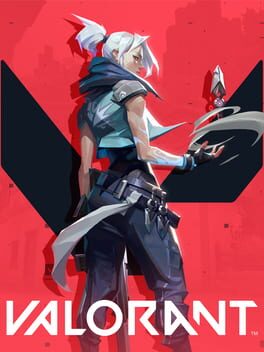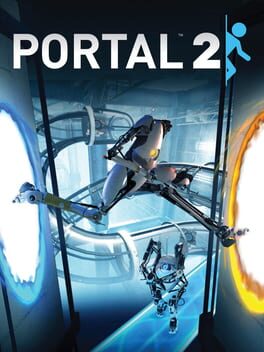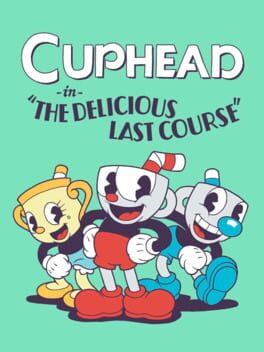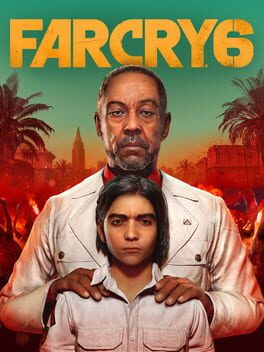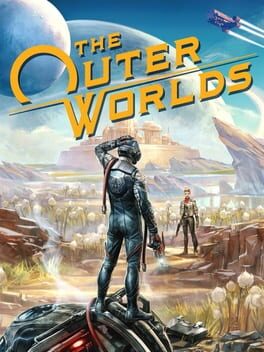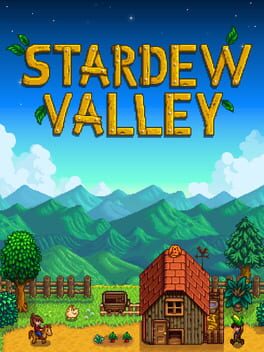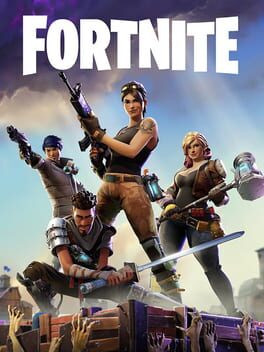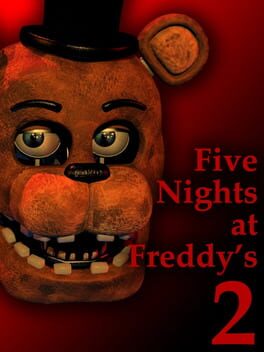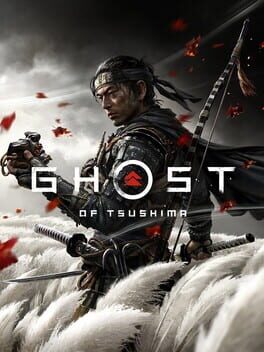Pursueth
3480 Reviews liked by Pursueth
Valorant
2020
Valorant
2020
Portal 2
2011
Portal 2 feels like the fully realized version of the original Portal. At it's core it feels the same, but the sequel just has so much more going for it, more personality.
In this game, Chell is no longer bound to the test chambers of Aperture Science like in the first Portal. After an incident in the story, she decides to take a little stroll through an abandoned salt mine and the backstage parts within the facility while she's at it. All of this while she is accompanied by three unique companions throughout the game. Speaking of the companions, the dialogue in Portal 2 is a big improvement over the one in Portal. In the first game, GLaDOS' comments happened every now and then, but here you pretty much have a narrator by your side all the time. This alone makes for quite the tonal shift in atmosphere to Portal, which had a pretty isolated and empty feeling to it - I can see how people prefer that, but personally I really enjoyed the extra dialogue and characters, since GLaDOS' remarks in the first game were one of the best parts for me. Back to the atmosphere in general, I think Valve did a really good job with setting an unique vibe for each individual area. My personal favorite is the salt mine, the vintage setting really landed for me!
As for gameplay, Portal 2 introduces a variety of mechanics to make the puzzles more enjoyable than the first game. Energy balls are completely gone this time and are replaced with light bridges, gravity beams, new cube variants and three different sorts of paint. Sounds like overkill at first, but those mechanics don't really overstay their welcome and they are really fun to play around with.
The narrative weaves those puzzles together in a logical way, while also delving into the background story of Chell and Aperture Science; there's some really good worldbuilding in there. The companions aren't one-note personalities and each one adds to the story with a different purpose, which makes them distinctive and memorable in their own ways.
Overall it's an amazing puzzle game, absolutely deserves the praise it's been getting. Had a good time with the main story, but the community maps are a nice treat if you're still in the mood for some more Portal action.
In this game, Chell is no longer bound to the test chambers of Aperture Science like in the first Portal. After an incident in the story, she decides to take a little stroll through an abandoned salt mine and the backstage parts within the facility while she's at it. All of this while she is accompanied by three unique companions throughout the game. Speaking of the companions, the dialogue in Portal 2 is a big improvement over the one in Portal. In the first game, GLaDOS' comments happened every now and then, but here you pretty much have a narrator by your side all the time. This alone makes for quite the tonal shift in atmosphere to Portal, which had a pretty isolated and empty feeling to it - I can see how people prefer that, but personally I really enjoyed the extra dialogue and characters, since GLaDOS' remarks in the first game were one of the best parts for me. Back to the atmosphere in general, I think Valve did a really good job with setting an unique vibe for each individual area. My personal favorite is the salt mine, the vintage setting really landed for me!
As for gameplay, Portal 2 introduces a variety of mechanics to make the puzzles more enjoyable than the first game. Energy balls are completely gone this time and are replaced with light bridges, gravity beams, new cube variants and three different sorts of paint. Sounds like overkill at first, but those mechanics don't really overstay their welcome and they are really fun to play around with.
The narrative weaves those puzzles together in a logical way, while also delving into the background story of Chell and Aperture Science; there's some really good worldbuilding in there. The companions aren't one-note personalities and each one adds to the story with a different purpose, which makes them distinctive and memorable in their own ways.
Overall it's an amazing puzzle game, absolutely deserves the praise it's been getting. Had a good time with the main story, but the community maps are a nice treat if you're still in the mood for some more Portal action.
Never has a game made me cry this much before.
It's snowing. A boy and his younger sister are starving and freezing, so they seek shelter in an abandoned supermarket to find rations and warmth. No one else is in sight, the streets and supermarket are empty - until mysterious shadows break into the store and threaten the siblings. With his remaining strength, the boy heads out to the parking lot and decides to take on the monsters with just an iron pipe and dark magic spells from a mysterious book, as he needs to protect his beloved sister at all costs. It's a hopeless battle, but the brother has no other choice.
NieR Replicant ver1.22 tells the tale of the young Nier and his quest to find a cure to heal his bedridden sister Yonah. Their parents are dead, so Nier is doing his best as a big brother and takes on various requests in his village to earn some pocket money to buy food, but at the same time he hates seeing his sister alone and wants to spend more time by her side. Life isn't easy for the two of them and it would be a shame if it got any worse.
Alright, I'm not giving an entire rundown of the plot here. My point is: The game is sad! Really sad. As you've read in the opening sentence, never has a game made me tear up and shiver as much as Replicant before and I'm a sucker for stories with emotional impact. It's really one of the best narratives I've ever seen. The moment I stepped foot into Aerie Village I knew I was in for a ride, but to be fair, the game does start rather slow and doesn't really gain momentum until an hour or so in, but that's because Replicant starts by showing Nier's daily life in the village and his routine (comparable to Twilight Princess' intro segment, but only half as long). The payoff is worth it though, as experiencing the plot unravel firsthand from an average shonen story to pure Yoko Taro madness is truly an one-of-a-kind experience and you'll never see this adventure the same way again after some reveals. Through episodic storytelling in the form of multiple routes, the player needs to replay a part of the game each time, but in each subsequent playthrough, new scenes that give context to certain events are added, which totally enhanced the experience for me, especially since you'll always know after your first playthrough what's going to happen next. Not gonna elaborate on that further, since it's a very spoilery topic by nature, so you should just experience it for yourself. However, I can understand how people are upset with the repetition, especially since the third playthrough is nearly identical to Route B. But trust me, pushing through is worth it and by the time you reach Ending E most of your questions should be answered, which is a great reward. The only thing I'm a bit torn on is the requirement to have all weapons in your inventory to access Routes C, D and E, since some of them are missable. A bunch of missed weapons can be bought at the blacksmith in Aerie Village after a certain point in the story, but some also require you to do three certain side quests. My recommendation: Since you can't get all the weapons on Route A normally anyways (3 are locked behind the World of Recycled Vessel content, which only unlocks after beating the game once), I suggest you just play through that one normally and pick up every weapon you find along the way (remember to break the crates!!) and if you are still missing some, you might look up where to get them on Route B. This requirement really shows the age of the original game, but shouldn't distract you from the overall outstanding narrative.
Okay, so the story is good, but what about the gameplay? I think it's great personally! (Except for the part where I broke the spring in my controller's right trigger... by dashing too much.) The controls are simple and the combat feels satisfying, there are great animations and the attacks feel like they have weight to them. Being able to utilize weapons and magic at the same time is really cool, you can pull off some interesting maneuvers by combining certain spells with standard attacks; there's even an in-game tutorial for it, if I remember correctly. But the combat is not the only aspect of the game, a lot of time is spent... backtracking (and fishing). There's really a lot of running around, especially if you're looking to complete as many side quests as possible. As someone who wanted to get the most out of Replicant, I finished the game with 97% sidequest completion and only left out two specific ones deliberately because I really didn't like the idea of spending several real-time days on the gardening part of the game with only a chance to get the flower seeds you need. That quest aside, surprisingly I really enjoyed my time with most of the sidequests! A whole lot of them were just fetch quests, yet you get some nice (voiced) dialogue out of them and I got to spend more time in this cozy world, so it didn't really matter to me - the extra banter alone made it worth to me. There's also some particularly good quests, like ones where you can make decisions that actually impact your rewards and the people around you. As an example, in one quest you can decide whether to help a criminal out or not and you have to live with that decision. Same goes for several occasions throughout the game where Nier can decide to either tell the truth or lie to people - there is no "right" choice and it's up to the player to decide what they think is for the best. Very cool.
The cast of this game is awesome, and I'm not just talking about the main party. Characters like the twins, Fyra or the postman really add to the liveliness in this overall rather bleak world and everyone has their own unique story behind them. I mean there's even a backstory for the fisherman who gives you all those fishing quests! Fishermen and postmen aside, Nier's actual companions deserve the spotlight just as much. Weiss, Emil and Kainé are some of the most unusual JRPG companions I have ever seen (and I love them for it), since they basically go against most of the common tropes you'd expect out of a sidekick. Personally I found the banter of the party to be really interesting at times, since their distinctive personalities are just destined to have a weird dispute every now and then.
The rearranged soundtrack is just beautiful. While NieR Gestalt focused more on the bass of the songs and sounds "rougher", Replicant ver1.22 centers the instruments more and has a "softer" tone, which fits the melancholic vibe incredibly well in my opinion. If you'd ask me to pickthree four favorite songs, I'm going with Snow in Summer, Temple of Drifting Sands, Song of the Ancients (Devola) and Fleeting Words (Outsider). I'm not linking them this time, because it's quite hard to find an upload of the individual ver1.22 arrangements on YouTube and its even harder to find spoiler-free ones (very important for a story-heavy game like this).
To wrap this up, I firmly believe Nier Replicant is a must-play for anyone who loves JRPGs with great narrative, characters and soundtrack (but can also handle a little repetition). While the game can be a little slow at times, the experience of slowly piercing this story and context together for yourself is unbeatable and I hopeit makes you just as sad you can find just as much enjoyment in it as I did!
It's snowing. A boy and his younger sister are starving and freezing, so they seek shelter in an abandoned supermarket to find rations and warmth. No one else is in sight, the streets and supermarket are empty - until mysterious shadows break into the store and threaten the siblings. With his remaining strength, the boy heads out to the parking lot and decides to take on the monsters with just an iron pipe and dark magic spells from a mysterious book, as he needs to protect his beloved sister at all costs. It's a hopeless battle, but the brother has no other choice.
NieR Replicant ver1.22 tells the tale of the young Nier and his quest to find a cure to heal his bedridden sister Yonah. Their parents are dead, so Nier is doing his best as a big brother and takes on various requests in his village to earn some pocket money to buy food, but at the same time he hates seeing his sister alone and wants to spend more time by her side. Life isn't easy for the two of them and it would be a shame if it got any worse.
Alright, I'm not giving an entire rundown of the plot here. My point is: The game is sad! Really sad. As you've read in the opening sentence, never has a game made me tear up and shiver as much as Replicant before and I'm a sucker for stories with emotional impact. It's really one of the best narratives I've ever seen. The moment I stepped foot into Aerie Village I knew I was in for a ride, but to be fair, the game does start rather slow and doesn't really gain momentum until an hour or so in, but that's because Replicant starts by showing Nier's daily life in the village and his routine (comparable to Twilight Princess' intro segment, but only half as long). The payoff is worth it though, as experiencing the plot unravel firsthand from an average shonen story to pure Yoko Taro madness is truly an one-of-a-kind experience and you'll never see this adventure the same way again after some reveals. Through episodic storytelling in the form of multiple routes, the player needs to replay a part of the game each time, but in each subsequent playthrough, new scenes that give context to certain events are added, which totally enhanced the experience for me, especially since you'll always know after your first playthrough what's going to happen next. Not gonna elaborate on that further, since it's a very spoilery topic by nature, so you should just experience it for yourself. However, I can understand how people are upset with the repetition, especially since the third playthrough is nearly identical to Route B. But trust me, pushing through is worth it and by the time you reach Ending E most of your questions should be answered, which is a great reward. The only thing I'm a bit torn on is the requirement to have all weapons in your inventory to access Routes C, D and E, since some of them are missable. A bunch of missed weapons can be bought at the blacksmith in Aerie Village after a certain point in the story, but some also require you to do three certain side quests. My recommendation: Since you can't get all the weapons on Route A normally anyways (3 are locked behind the World of Recycled Vessel content, which only unlocks after beating the game once), I suggest you just play through that one normally and pick up every weapon you find along the way (remember to break the crates!!) and if you are still missing some, you might look up where to get them on Route B. This requirement really shows the age of the original game, but shouldn't distract you from the overall outstanding narrative.
Okay, so the story is good, but what about the gameplay? I think it's great personally! (Except for the part where I broke the spring in my controller's right trigger... by dashing too much.) The controls are simple and the combat feels satisfying, there are great animations and the attacks feel like they have weight to them. Being able to utilize weapons and magic at the same time is really cool, you can pull off some interesting maneuvers by combining certain spells with standard attacks; there's even an in-game tutorial for it, if I remember correctly. But the combat is not the only aspect of the game, a lot of time is spent... backtracking (and fishing). There's really a lot of running around, especially if you're looking to complete as many side quests as possible. As someone who wanted to get the most out of Replicant, I finished the game with 97% sidequest completion and only left out two specific ones deliberately because I really didn't like the idea of spending several real-time days on the gardening part of the game with only a chance to get the flower seeds you need. That quest aside, surprisingly I really enjoyed my time with most of the sidequests! A whole lot of them were just fetch quests, yet you get some nice (voiced) dialogue out of them and I got to spend more time in this cozy world, so it didn't really matter to me - the extra banter alone made it worth to me. There's also some particularly good quests, like ones where you can make decisions that actually impact your rewards and the people around you. As an example, in one quest you can decide whether to help a criminal out or not and you have to live with that decision. Same goes for several occasions throughout the game where Nier can decide to either tell the truth or lie to people - there is no "right" choice and it's up to the player to decide what they think is for the best. Very cool.
The cast of this game is awesome, and I'm not just talking about the main party. Characters like the twins, Fyra or the postman really add to the liveliness in this overall rather bleak world and everyone has their own unique story behind them. I mean there's even a backstory for the fisherman who gives you all those fishing quests! Fishermen and postmen aside, Nier's actual companions deserve the spotlight just as much. Weiss, Emil and Kainé are some of the most unusual JRPG companions I have ever seen (and I love them for it), since they basically go against most of the common tropes you'd expect out of a sidekick. Personally I found the banter of the party to be really interesting at times, since their distinctive personalities are just destined to have a weird dispute every now and then.
The rearranged soundtrack is just beautiful. While NieR Gestalt focused more on the bass of the songs and sounds "rougher", Replicant ver1.22 centers the instruments more and has a "softer" tone, which fits the melancholic vibe incredibly well in my opinion. If you'd ask me to pick
To wrap this up, I firmly believe Nier Replicant is a must-play for anyone who loves JRPGs with great narrative, characters and soundtrack (but can also handle a little repetition). While the game can be a little slow at times, the experience of slowly piercing this story and context together for yourself is unbeatable and I hope
NieR: Automata
2017
A great display of video games as an artform.
NieR: Automata is a game that goes above and beyond with its unique way of storytelling, taking full advantage of making the experience one that can't be substituted through a book or a movie - not just in terms of visual design, but also through the use of dynamic music and having its story told from the point of view of multiple protagonists.
Note that I have played NieR Replicant (the first game) right before this entry, so comparing the two games was inevitable for me. On one hand I still feel like I was doing Automata a disservice by doing so, but at the same time it was nice hearing remixes of familiar songs when they were still fresh in my memory. Either way, in my opinion something very important to anyone interested in this game, is to play Replicant first if you want the full experience. Not only because you would miss many cool references, but also because Automata doesn't hold back with spoiling the first game through the documents you can find in it and personally I'd be pretty upset if I read those before playing Replicant. Those documents are cool for returning players because you get more context for the events of the previous entry, but also spoil some of the biggest twists. Play this first at your own risk.
In contrast to Replicant, Automata's story has a lot more spectacle to it than Replicant's more grounded and personal narrative. This time you're not taking control of the teenage boy who wants to cure his sister, but instead slip into the role of android warrior 2B, who is fighting in an all-out war against machines to reclaim the planet. Considering the scale of the story, you're just one of many androids - Automata is less about the characters' personal struggles and more about the main conflict at hand. And while the overarching narrative is solid, the real highlight is how the story is told and the messages behind it. This game has multiple routes and endings and they're used particularly well here, compared to Replicant, where the routes were the same in terms of gameplay, but with new scenes. Even if Automata's Route A and B are the same string of events told through a different perspective (which turned a surprising amount of people off from doing multiple routes), the unique gameplay of 9S and some scenes from his perspective alone are worth warranting the second playthrough. Route C however is where the story really picks up in pace, while also being a fresh experience at the same time. New enemies, new plot, new soundtrack. (The enemy variety in Automata in general is way better than Replicant, there are so many machines and bosses with cool ideas!) Also, the finale of Route C completely blew me away with the "art direction" of it and the final battle at the end was the cherry on top. For those concerned about missables, after beating this route, you'll unlock Chapter Select and can freely return to any point in the story before, so there's no reason for FOMO, feel free to tackle the game at your own pace. In regards to achievements, what I found particularly interesting was the integration of a trophy shop. It's just like the name would suggest, a hidden in-game shop where you can buy the remaining achievements in exchange for virtual currency. Pretty cool if you locked yourself out of a trophy, but also really made me think about the actual point of trophies in general...
Combat and movement in Automata are definitely an upgrade to Replicant's combat... for the most part. Coming right from the first game, I was a bit surprised how slippery the controls felt, like they didn't have much weight to them. The most glaring difference was the missing vibration on hit though, it really gave the attacks more impact for me. Turns out the controls are actually quite good and responsive after spending a while with them, it just took me a bit to adjust. Now, the combat in Automata literally consists of hack-and-slash. As 2B, your main approach to offense will be slashing through the enemies (while looking really stylish) by dual-wielding a set of two weapons of choice, reaching from her signature katanas to the Beastbane from Replicant, you're free to mix and match towards whatever matches your own personal playstyle. Meanwhile the other protagonist, 9S, puts the emphasis on the "hack" in hack-and-slash. He does not have the luxury of using two weapons at once, as his model is not designed for combat, but rather for gathering intel - in gameplay terms this means you can hack into your enemies to deal large amounts of damage, destroying most normal enemies instantly. Hacking consists of a Space Invaders-like bullet hell minigame, where you need to shoot down hostile ships or towers which are shooting projectiles at you. If you get hit three times, you're getting kicked and need to hack the enemy again to get another shot at the minigame. In order to successfully complete a hack, normally all enemies need to be destroyed before being able to shoot the otherwise guarded core, but there are some exceptions, like bosses and special hacks have unique screens with other conditions attached to them. Hacking and slashing aside, there's actually a third type of combat (even if it's rarely used), the aerial combat. There are a few parts where you're mounting a flying mech and need to shoot down enemies in a rail shooter-like fashion. These segments are either 2D or top-down, your possible movements are defined by the camera angle.
Following up to the "possible movements", I'd like to talk about the possible movements in the overworld and the level design in general, because I'm really sold on both of those aspects. Moving around feels great, has a very parkour-ish feel to it and hopping or gliding onto certain structures is awesome. This also comes from the level design being a lot of fun to traverse and explore, a big step up from Replicant. All areas have an unique theme they're designed after and they're like semi-open worlds. No loading screens (aside from the ones disguised as elevators) are a huge plus and make for a really seamless experience. Not to mention those individual levels are gorgeous and still filled with so many small details, my favorites are the Forest Kingdom and Amusement Park. Shoutout to the Flooded City, although I wish that area was a bit larger. After reflecting on those areas, I'm not really sure if I prefer the medieval design of Replicant's world or the post-apocalyptic world of Automata. But one thing is for certain: traversing Automata's world didn't break my controller's right trigger spring. (Yeah, that happened in Replicant. Not even because I threw the controller or anything, it was just because I dashed a lot...)
The soundtrack is excellent. As I already stated in my opener, NieR Automata greatly makes use of the dynamic soundtracks - this means the songs shift between multiple variants, based on what is currently happening. Like when you hack an enemy as 9S, the current song slowly transitions into an 8-Bit version, depending on how much the hacking meter is filled, eventually the the hacking sequence starts and the full 8-Bit rendition plays until the minigame is completed, where it fades back to the normal version. But not only does the combat have changing music, the songs in individual areas also change based on location or story progress. An example fairly early on is the desert theme, Memories of Dust. As you walk into the desert for the first time, you will hear an instrumental version of this song, but as you get closer to the apartment ruins, the vocals fade in. It also works in reverse, because if you walk away from that location, the lyrics will fade out again. The most impactful use of the dynamic soundtrack for me was at the very end, and I won't specify this further, since you'll know what I mean when you get there.
Something very important for the PC players: Please do yourself a favor and set the anti-aliasing to SMAA, because MSAA looks really horrible in this port and also chugs performance for some reason; you won't even get consistent 60 frames, because there's some built-in limiter. Meanwhile the FidelityFX CAS option makes the colors look off, so I'd recommend turning that off too. These two things unironically took me three hours to figure out and I don't want you to go through the same pain.
In the end, I absolutely adored NieR Automata as an experience. While it didn't emotionally impact me nearly as much as Replicant, I prefer the direction and creative approach in this one, like using the route system for something a lot more meaningful than playing through the exact same events three times (and the final area four times!). It's definitely a game I will be thinking about for quite some time, as it really opened my eyes on games as an artform. Thanks for reading and glory to mankind!
NieR: Automata is a game that goes above and beyond with its unique way of storytelling, taking full advantage of making the experience one that can't be substituted through a book or a movie - not just in terms of visual design, but also through the use of dynamic music and having its story told from the point of view of multiple protagonists.
Note that I have played NieR Replicant (the first game) right before this entry, so comparing the two games was inevitable for me. On one hand I still feel like I was doing Automata a disservice by doing so, but at the same time it was nice hearing remixes of familiar songs when they were still fresh in my memory. Either way, in my opinion something very important to anyone interested in this game, is to play Replicant first if you want the full experience. Not only because you would miss many cool references, but also because Automata doesn't hold back with spoiling the first game through the documents you can find in it and personally I'd be pretty upset if I read those before playing Replicant. Those documents are cool for returning players because you get more context for the events of the previous entry, but also spoil some of the biggest twists. Play this first at your own risk.
In contrast to Replicant, Automata's story has a lot more spectacle to it than Replicant's more grounded and personal narrative. This time you're not taking control of the teenage boy who wants to cure his sister, but instead slip into the role of android warrior 2B, who is fighting in an all-out war against machines to reclaim the planet. Considering the scale of the story, you're just one of many androids - Automata is less about the characters' personal struggles and more about the main conflict at hand. And while the overarching narrative is solid, the real highlight is how the story is told and the messages behind it. This game has multiple routes and endings and they're used particularly well here, compared to Replicant, where the routes were the same in terms of gameplay, but with new scenes. Even if Automata's Route A and B are the same string of events told through a different perspective (which turned a surprising amount of people off from doing multiple routes), the unique gameplay of 9S and some scenes from his perspective alone are worth warranting the second playthrough. Route C however is where the story really picks up in pace, while also being a fresh experience at the same time. New enemies, new plot, new soundtrack. (The enemy variety in Automata in general is way better than Replicant, there are so many machines and bosses with cool ideas!) Also, the finale of Route C completely blew me away with the "art direction" of it and the final battle at the end was the cherry on top. For those concerned about missables, after beating this route, you'll unlock Chapter Select and can freely return to any point in the story before, so there's no reason for FOMO, feel free to tackle the game at your own pace. In regards to achievements, what I found particularly interesting was the integration of a trophy shop. It's just like the name would suggest, a hidden in-game shop where you can buy the remaining achievements in exchange for virtual currency. Pretty cool if you locked yourself out of a trophy, but also really made me think about the actual point of trophies in general...
Combat and movement in Automata are definitely an upgrade to Replicant's combat... for the most part. Coming right from the first game, I was a bit surprised how slippery the controls felt, like they didn't have much weight to them. The most glaring difference was the missing vibration on hit though, it really gave the attacks more impact for me. Turns out the controls are actually quite good and responsive after spending a while with them, it just took me a bit to adjust. Now, the combat in Automata literally consists of hack-and-slash. As 2B, your main approach to offense will be slashing through the enemies (while looking really stylish) by dual-wielding a set of two weapons of choice, reaching from her signature katanas to the Beastbane from Replicant, you're free to mix and match towards whatever matches your own personal playstyle. Meanwhile the other protagonist, 9S, puts the emphasis on the "hack" in hack-and-slash. He does not have the luxury of using two weapons at once, as his model is not designed for combat, but rather for gathering intel - in gameplay terms this means you can hack into your enemies to deal large amounts of damage, destroying most normal enemies instantly. Hacking consists of a Space Invaders-like bullet hell minigame, where you need to shoot down hostile ships or towers which are shooting projectiles at you. If you get hit three times, you're getting kicked and need to hack the enemy again to get another shot at the minigame. In order to successfully complete a hack, normally all enemies need to be destroyed before being able to shoot the otherwise guarded core, but there are some exceptions, like bosses and special hacks have unique screens with other conditions attached to them. Hacking and slashing aside, there's actually a third type of combat (even if it's rarely used), the aerial combat. There are a few parts where you're mounting a flying mech and need to shoot down enemies in a rail shooter-like fashion. These segments are either 2D or top-down, your possible movements are defined by the camera angle.
Following up to the "possible movements", I'd like to talk about the possible movements in the overworld and the level design in general, because I'm really sold on both of those aspects. Moving around feels great, has a very parkour-ish feel to it and hopping or gliding onto certain structures is awesome. This also comes from the level design being a lot of fun to traverse and explore, a big step up from Replicant. All areas have an unique theme they're designed after and they're like semi-open worlds. No loading screens (aside from the ones disguised as elevators) are a huge plus and make for a really seamless experience. Not to mention those individual levels are gorgeous and still filled with so many small details, my favorites are the Forest Kingdom and Amusement Park. Shoutout to the Flooded City, although I wish that area was a bit larger. After reflecting on those areas, I'm not really sure if I prefer the medieval design of Replicant's world or the post-apocalyptic world of Automata. But one thing is for certain: traversing Automata's world didn't break my controller's right trigger spring. (Yeah, that happened in Replicant. Not even because I threw the controller or anything, it was just because I dashed a lot...)
The soundtrack is excellent. As I already stated in my opener, NieR Automata greatly makes use of the dynamic soundtracks - this means the songs shift between multiple variants, based on what is currently happening. Like when you hack an enemy as 9S, the current song slowly transitions into an 8-Bit version, depending on how much the hacking meter is filled, eventually the the hacking sequence starts and the full 8-Bit rendition plays until the minigame is completed, where it fades back to the normal version. But not only does the combat have changing music, the songs in individual areas also change based on location or story progress. An example fairly early on is the desert theme, Memories of Dust. As you walk into the desert for the first time, you will hear an instrumental version of this song, but as you get closer to the apartment ruins, the vocals fade in. It also works in reverse, because if you walk away from that location, the lyrics will fade out again. The most impactful use of the dynamic soundtrack for me was at the very end, and I won't specify this further, since you'll know what I mean when you get there.
Something very important for the PC players: Please do yourself a favor and set the anti-aliasing to SMAA, because MSAA looks really horrible in this port and also chugs performance for some reason; you won't even get consistent 60 frames, because there's some built-in limiter. Meanwhile the FidelityFX CAS option makes the colors look off, so I'd recommend turning that off too. These two things unironically took me three hours to figure out and I don't want you to go through the same pain.
In the end, I absolutely adored NieR Automata as an experience. While it didn't emotionally impact me nearly as much as Replicant, I prefer the direction and creative approach in this one, like using the route system for something a lot more meaningful than playing through the exact same events three times (and the final area four times!). It's definitely a game I will be thinking about for quite some time, as it really opened my eyes on games as an artform. Thanks for reading and glory to mankind!
Far Cry 6
2021
Death Stranding
2019
The Outer Worlds
2019
Stardew Valley
2016
Fortnite
2017
Portal 2
2011
Ghost of Tsushima
2020
this will be Assassin's Creed in 2013
it was about time we took this rotten western formula to defile eastern media as well. it's not bad enough to make you feel disgusting while playing but it's still so utterly bland and dull...
i can forgive the repetitive gameplay and nonskippable dialogue but come on at least let me cut down civillians to get the true samurai experience or something. it does look cool though.
it was about time we took this rotten western formula to defile eastern media as well. it's not bad enough to make you feel disgusting while playing but it's still so utterly bland and dull...
i can forgive the repetitive gameplay and nonskippable dialogue but come on at least let me cut down civillians to get the true samurai experience or something. it does look cool though.
Hades
2018
"Back already?"
After spending around 20 hours with Hades resulting in feelings of highs and lows I've come to the only conclusion these emotions could finally ascertain. I love everything about Hades, except actually playing it. This is both the best roguelike game and worst I've ever played and it's impressive how much that swings backwards and forwards.
The interesting thing to me mulling this over in my head, and to use a Greek mythological term of phrase, is that Hades greatest strength is it's Achilles heel. This game wants you to die, yes it's how Roguelikes function, but I have never felt that more in others than in Hades. Each time you die you get a bit more character interaction, a bit more dialogue between characters by design. These interactions are eked between the protagonist, Zagreus the son of Hades the Greek God of the underworld and it's occupants. Each attempted escape from the underworld Zagreus gets a little more development from the mythical residents of the house of Hades such as Cerberus, Nyx, Hypnos, Thanatos etc. They will slowly grow and reveal more about themselves and the situation Zagreus is in and it's great. The characters are well written and the amount of content and spoken dialogue is absurdly impressive. Dying is how you progress this, dying isn't failure, dying is a reward for the setting, for the theme of Hades. Death is Hades business and Supergiant games was extremely clever in how it's implemented that as not only the known Roguelike mechanic but as a fundamental mechanic to the story of Hades.
I really like the cast. Getting snippets of conversations with the gods of Olympus and lesser known Greek mythological characters is a real treat each time. I also love their art design, it's pretty clear who each character is without stereotyping them too much. The voice acting equally puts in work to match the excellent writing. My favourite being Dionysus the god of wine who comes across as such an extremely laid back almost surfer like attitude but there is a tone of strength behind it all in his voice as well as art with his chiselled physique. Hades presentation really is excellent.
So where is the weakness here you ask? It's the actual dungeon runs in which the game wants you to die in to get these slow roll story sequences that hurt it sounds badly. This game is 40 minutes of gameplay dragged out into hours and I despise it for that. Each run has so little variety that it gets stale to actually play each time. Finishing a run didn't make me want to go again, it made me sigh that I would have to fight the same 3 bosses over again on the same levels in the same order. It's extremely linear and stale and the more I played the game, the less I wanted to.
I stuck with it for the excellent setting, art and characters. The thing is it actually plays really well. The animations are smooth, the combat is fun, there are 6 weapons to choose between that all have great moves and the boons from the gods of Olympus you collect can add some good variety to how the combat plays out. In the end though it's all the same, you will fight the same limited enemies, bosses and room types in the same order. I expected a variety of bosses that would be random on each run, corridors, challenges, just something? It's 40 minutes of game you play repeatedly. It felt like groundhog day.
Later in the game you can add modifiers to make it harder which can change things slightly and there are some prophecies to aim for in trying to get certain boons but it doesn't change those 40 minutes enough in any way to not feel like this is just a short experience painfully dragged out. To get the full credits you need to complete 10 playthroughs once you are strong enough or get lucky enough runs. It took me 25 runs just to beat it once. There is some permanent progress you can unlock with skills in a mirror and construction requests but equally they feel like padding to make it take you time to unlock all the story rather than rewards. This is felt more than anything with the god mode option. In the settings you can switch it on "To make it easier or if you just want to see the story". The issue is that the game wants you to die to progress the story and character interactions so god mode gives you some base damage resistance then 2% each time you die. Even trying to speed through the game after I had beaten it the first time it's still doled out at a trickle as it counters what the game wants you to do. It wants you to die, thematically and narratively, this is clever, this is great, it lacks the variety to keep that interesting in practice though.
It's a real shame too because a greater pool of bosses, levels and enemies to make each run feel fresh would have made this a truly great game. After a certain point though I died to Hades with a pretty sub optimal boon run and just felt, exasperation. I would have to do the same levels and bosses again and decided to put the game down. I watched the true ending on youtube and it was cute, I just didn't want hours of repetition to get there. I didn't feel I'd missed much by watching the ending and skipping the faff. Maybe it's me? I mean I played Vampire Survivors, this game designed for addiction. I did three runs for 30 mins each and put it down feeling like I'd seen everything. I guess that "one more run" mentality for games like this just don't have that effect.
I happily play 500+ hours in each Monster Hunter game though so what do I know?
+ Setting as a Roguelike is excellent thematically.
+ Characters, voice acting and artwork are great.
+ Combat is smooth and fun.
- Dungeon runs lack variety, same bosses and enemies makes things feel dragged out.
- Gets boring fast.
After spending around 20 hours with Hades resulting in feelings of highs and lows I've come to the only conclusion these emotions could finally ascertain. I love everything about Hades, except actually playing it. This is both the best roguelike game and worst I've ever played and it's impressive how much that swings backwards and forwards.
The interesting thing to me mulling this over in my head, and to use a Greek mythological term of phrase, is that Hades greatest strength is it's Achilles heel. This game wants you to die, yes it's how Roguelikes function, but I have never felt that more in others than in Hades. Each time you die you get a bit more character interaction, a bit more dialogue between characters by design. These interactions are eked between the protagonist, Zagreus the son of Hades the Greek God of the underworld and it's occupants. Each attempted escape from the underworld Zagreus gets a little more development from the mythical residents of the house of Hades such as Cerberus, Nyx, Hypnos, Thanatos etc. They will slowly grow and reveal more about themselves and the situation Zagreus is in and it's great. The characters are well written and the amount of content and spoken dialogue is absurdly impressive. Dying is how you progress this, dying isn't failure, dying is a reward for the setting, for the theme of Hades. Death is Hades business and Supergiant games was extremely clever in how it's implemented that as not only the known Roguelike mechanic but as a fundamental mechanic to the story of Hades.
I really like the cast. Getting snippets of conversations with the gods of Olympus and lesser known Greek mythological characters is a real treat each time. I also love their art design, it's pretty clear who each character is without stereotyping them too much. The voice acting equally puts in work to match the excellent writing. My favourite being Dionysus the god of wine who comes across as such an extremely laid back almost surfer like attitude but there is a tone of strength behind it all in his voice as well as art with his chiselled physique. Hades presentation really is excellent.
So where is the weakness here you ask? It's the actual dungeon runs in which the game wants you to die in to get these slow roll story sequences that hurt it sounds badly. This game is 40 minutes of gameplay dragged out into hours and I despise it for that. Each run has so little variety that it gets stale to actually play each time. Finishing a run didn't make me want to go again, it made me sigh that I would have to fight the same 3 bosses over again on the same levels in the same order. It's extremely linear and stale and the more I played the game, the less I wanted to.
I stuck with it for the excellent setting, art and characters. The thing is it actually plays really well. The animations are smooth, the combat is fun, there are 6 weapons to choose between that all have great moves and the boons from the gods of Olympus you collect can add some good variety to how the combat plays out. In the end though it's all the same, you will fight the same limited enemies, bosses and room types in the same order. I expected a variety of bosses that would be random on each run, corridors, challenges, just something? It's 40 minutes of game you play repeatedly. It felt like groundhog day.
Later in the game you can add modifiers to make it harder which can change things slightly and there are some prophecies to aim for in trying to get certain boons but it doesn't change those 40 minutes enough in any way to not feel like this is just a short experience painfully dragged out. To get the full credits you need to complete 10 playthroughs once you are strong enough or get lucky enough runs. It took me 25 runs just to beat it once. There is some permanent progress you can unlock with skills in a mirror and construction requests but equally they feel like padding to make it take you time to unlock all the story rather than rewards. This is felt more than anything with the god mode option. In the settings you can switch it on "To make it easier or if you just want to see the story". The issue is that the game wants you to die to progress the story and character interactions so god mode gives you some base damage resistance then 2% each time you die. Even trying to speed through the game after I had beaten it the first time it's still doled out at a trickle as it counters what the game wants you to do. It wants you to die, thematically and narratively, this is clever, this is great, it lacks the variety to keep that interesting in practice though.
It's a real shame too because a greater pool of bosses, levels and enemies to make each run feel fresh would have made this a truly great game. After a certain point though I died to Hades with a pretty sub optimal boon run and just felt, exasperation. I would have to do the same levels and bosses again and decided to put the game down. I watched the true ending on youtube and it was cute, I just didn't want hours of repetition to get there. I didn't feel I'd missed much by watching the ending and skipping the faff. Maybe it's me? I mean I played Vampire Survivors, this game designed for addiction. I did three runs for 30 mins each and put it down feeling like I'd seen everything. I guess that "one more run" mentality for games like this just don't have that effect.
I happily play 500+ hours in each Monster Hunter game though so what do I know?
+ Setting as a Roguelike is excellent thematically.
+ Characters, voice acting and artwork are great.
+ Combat is smooth and fun.
- Dungeon runs lack variety, same bosses and enemies makes things feel dragged out.
- Gets boring fast.
